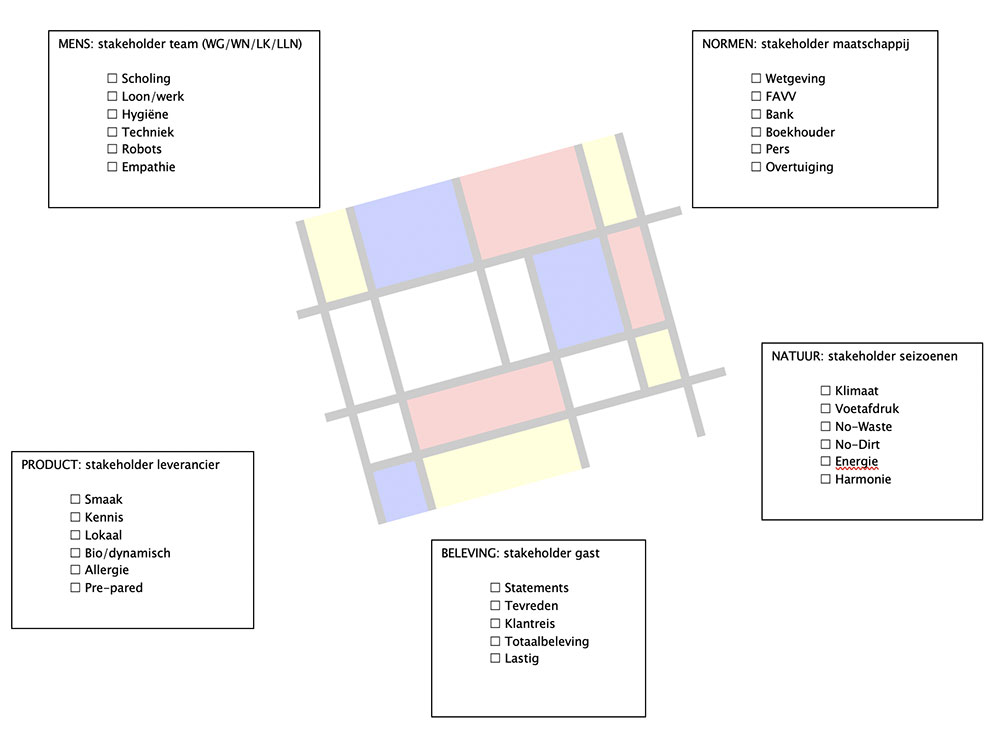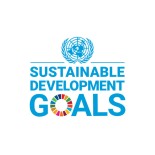Author: Guido Francque
Sustainability has only become a hot topic in recent years. Yet sustainability is of all times & was historically embedded in our culture. This has been slow at first since the Industrial Revolution and the more recent the faster. To stay in our hospitality sector: food and drink was the health pharmacy of man; today no one is aware of this task & interpretation, let alone that in gastronomy there is still attention paid to it …
But the world is not standing still & in the meantime many institutions, NGOs and official bodies have woken up and are offering very interesting programmes and trajectories to return to sustainability. However, this is not the case in our hospitality sector on a practical level. That's why I drew up an easy-to-follow and easy-to-implement trajectory from practice on the shop floor, with a checklist as a starting point. Below is a clarification of the overview framework
overview framework "sustainability in the hospitality industry".
The overview framework shows the connection between the four fundamental components with the five main stakeholders, out of mutual respect.
cherish the freedom to leave room for contemporary creativity.
The work of art in the background by Pieter Cornelis Mondriaan (1872-1944) Red, yellow and blue (1929) was auctioned for € 44 million….
This work of art is composed of only the three basic colours and a few black lines, leaving a lot of space for white. Nevertheless, an astronomical amount of money was offered for this work. It serves here as a metaphor for our creativity in gastronomy; meaning on the one hand that we can achieve great results with a few basic components in the plate; and on the other hand that we must always leave room for unbridled creativity. Or to put it in the words of Martinus Nijhoff: "Simplicity is not simple.”
importance of 4 expressions for the word 'respect'.
In our current society, words such as respect and hierarchy have virtually disappeared from our vocabulary. Nevertheless, they are the pillars of Socially Sustainable Entrepreneurship; and certainly in the hospitality industry, where they form the thread running through our profession, together with hospitality and altruism. The word respect is shown here in four versions, because it is necessary in the four fundamental components of sustainable hospitality: respect, esteem, appreciation, respect.
breaking down the 4 fundamental components of sustainable hospitality.
Sustainable hospitality can be divided into four perspectives, which together form the foundation: in value order of HUMAN, PRODUCT, NORMAL and NATURE. These four components are siamese connected to each other, but can be studied separately to make it more workable.
acknowledging & defining the 5 key stakeholders.
In order to achieve perfect sustainability, it is important to know all stakeholders of our organization. To make it easier to work, they are bundled into 5 umbrella organisations, in this order of importance: TEAM (employer + employees), SUPPLIER, DIMENSION, SEASON and GAST.
- The TEAM (which emphasises the importance of team spirit between employer and employee) includes training, pay/work ratio, hygiene, technology, robotisation and empathy.
- At the SUPPLIER, taste, knowledge, local, bio/dynamic, allergy and prepared (read: convenience) are collected.
- under MEASUREMENT, legislation, FASFC, bank, accountant, press and conviction are bundled.
- SEASONS stand for climate, footprint, no-waste, no-dirt, energy and harmony.
- the GUEST is deliberately studied as 5th and last and bundles not only a number of - at first sight controversial - statements, but also satisfaction, customer journey (read: customer journey), total experience and difficult (read: problem solving).
explanation why these 5 stakeholders are the most important.
The success of a hospitality company stands or falls with the composition and quality of the team. The success of the sustainability principle depends primarily on the will and ambition of the team to achieve this. If the team can work with like-minded suppliers who share the sustainability story and ideally function according to this philosophy themselves, then the second extremely important step towards sustainability has been taken. If the team functions with respect for social rules, and sees standards as a source of advice, then the third big step is guaranteed. If the team works and lives in harmony with nature, and seeks respect for it, then the fourth big step has been taken. If the team respects the above stakeholders and itself, then it is the final goal-stakeholder (guest) as 5th most important who benefits from this and ensures that the team can function in a financially healthy way.














